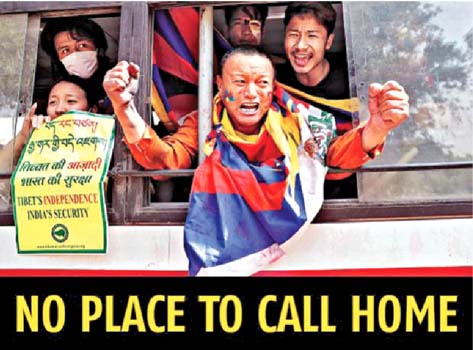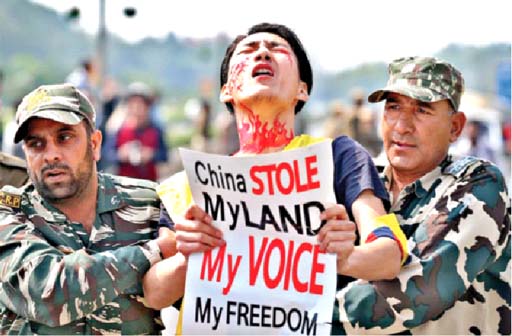No country has stood up and actively opposed the grave and open human rights violations in Tibet by Communist China. Law of jungle still prevails here as the bigger fish goes on eating the smaller fish, with no protest from the world
-Meera Sharma

Tibet’s occupation by China has been the most violent episodes
of 20th century forgotten by the world
of 20th century forgotten by the world
The Physical Invasion
It includes deadly plots, which it shouldn’t have. It includes conspiracies, economic ambitions, which it shouldn’t include. It includes murders in masses, which should have been out of the question! Because it is Tibet we’re talking about, it is Buddhism we’re referring to, and it is the world’s forbidden city we’re calling out to. All this started getting buried in the past, centuries ago, but the suffering took an even more dreadful shape in the 19th century by the great empire of ‘The Republic Of China’. It seemed the law of jungle still prevailed. The bigger fish goes on eating, the smaller fish – no protest.
Taiwan, Tibet, Hong Kong etc., the list of the countries is long but well in the clutches of the Republic. To understand what causes the Chinese to be so anxious and ambitious to gain lands and grow, can only be understood through their mindsets which are ruled by many historical state of affairs that came their way moulding them into who they are today. It also becomes essential to understand this for the futures to come and to understand what to expect.
According to the New York Times report, the three points that the Chinese leaders give their people, which makes them strive for more than others, and to see the world through a narrow mindset are, first, 100 years of humiliation by the western imperialists, second, ten years of unrest under the Cultural Revolution, third, 25 years of an economic miracle under reforms and openness introduced by Denzin Xiaoping. The first two creates isolation from the west and the world, whereas the third glorifies the self-made efforts for reforms rather than trusting the country with anyone else. ‘Fear of chaos has developed conservatism and the nation’s shrewd ambitions.’
As researched by The College of Staten Island’s Modern China Studies Group, Chinese people are consumed by anxiety about more mundane issues. As one popular saying in China goes, “the reform on the state-owned enterprises is to keep you off work, the housing reform is to empty your pocket, the educational reform is to drive your parents crazy, and the medical health reform is to send you to the grave ahead of time.” This showcases how the Chinese community looks at the world beyond their borders.
The Cultural Invasion
Pragmatism, meritocracy, Confucianism, historical longevity, population, individual specialization, etc., and many others are terms that lead to one another in Chinese social and political mindsets. The baseline being lots of competition. It is very well put up by an old Chinese citizen ‘You have to maximize your maximization so that you can keep your advantages and get more.’ Continuing which, they put through that ‘when you grow up with that kind of continual tug-of-war of your advantages vs anybody else’s advantages, it doesn’t take a rocket scientist to see the whole modus vivendi of that; it just carries over to any other part of life. And when a couple of million others have grown up in the same way, that attitude and outlook become self-reinforcing and self-propagating.’
The above paragraphs form perfect justifications to what Chinese have been doing with Tibet, Hong Kong, Macau and now Taiwan. We live in a world of cooperation, rights and identities which are and must be respected. Living in historical speculations and eras managed by a few leaders can only lead to one thing, that is, the end of the present and the future.
This is the way China did gain the body of Tibet but lost its soul; it gained the beautiful lands of Tibet but lost Buddhism, the highest attraction.
The reason behind is the materialistic beliefs because that is where they compete. What do I want, what is most beneficial to my conscious self, what do I want now, tomorrow, and 20 years from now. Strategically and practically are the moves planned by the Chinese. They put a lot of emphasis on what they call ‘reality’. But one of the highest religion Buddhism emphasizes long term questions like, “what after death, the meaning of existence.’ Something which cannot be proved by shrewd business strategies and experiments because the short term questions they are focused on, for examples is ‘What about my grandchild?’
No wonder the understanding of Buddhism was out of the question for them and appeared loss-making to them. But, the Chinese were intelligent enough to get through their ultimate goal of ‘unification’ in steps starting from the 1950s and ending with the total takeover in 1959 by striking an ideological debate. The idea was to end Buddhist ideology through the slow poison of leaving them uneducated and firing ‘thamzing’ (Class struggle).
Camouflaging their crimes
The starting incidents can make you laugh but also strike right on the problem of Chinese materialistic ideology! When in 1953 a group of 10 Chinese soldiers in Khaki arrived in Sakya, Tibet, they were shown disapproval by the local people clapping and cursing which was a common way of dogpa (negation of evil). The soldiers, rather than understanding the insult, joined them in clapping, amazed by the welcome they had just received! It was a thing to wonder for them that insult and disapproval can also be so peaceful and non-violent. The red materialism was far away from such phenomena.
Series of diplomatic steps were taken intelligently by the Chinese to gain sympathy and feeling for the Republic. Some of which included gaining the trust of Aristocrats and the upper-class people after the Seventeen point agreement (1951) which gave Tibet the freedom to be autonomous. The aristocrats were promised their power and status would prevail forever even after the reforms take place, and it might as well increase. These people were chosen for special tours to the industrialized regions of China for them to return, impressed by the Red form of governance.
The irony is that communism was built with great respect for labourers, daily wage workers, lower class common people but rather the communist state was using factors and people to fulfil its ambitions against which and whom, it had stood up for once: aristocracy. Flaws are inevitable.

China’s has used force and violence to suppress the Tibetan
freedom movement and diplomatic manoeuvres to silence the world
freedom movement and diplomatic manoeuvres to silence the world
Tibetan cities were divided into teams of underemployed Chinese officials. Criminals of Tibet who would work with cruelty were employed as heads of these groups as they were offered positions to pay off old scores.
Slow poisoning
Seventeen point agreement in 1951: Tibetans were handed over materialistic freedom by the Chinese giving them political and cultural freedom in an autonomous region. Unaware that Tibetan independence was always based more on their life and culture than the law and history. The economic condition of the peasants and herdsmen of the non-communist state of Tibet was far better than the ROC. Maybe this became one of the reasons why labourers were not focused on for ideological transformations as it seemed practically impossible to show a better system than the one prevalent in Tibet for them.
The next set of transformation lot(group) after the aristocrats started hanging Mao’s clay statues in their homes secretly, no need to mention how influenced they were, came the young minds when in 1956 blue coloured uniformed personnel came to Tibet to open ‘Red Schools’, and to start youth organizations while politely asking Tibetans to merge traditional schools with these. Of course, the first to admit were the children of the aristocrats and ruling class of Tibet, going well with Pecking’s (Beijing till 1979) strategy of the ruling class being made to play an important role in bringing up a peaceful revolution. Almost all the local rulers unconsciously supported this backstabbing strategy, unaware of what they are yet to see.
The aristocrats were paid for their patriotism and cooperation. The labourers were paid to build the military road for the Chinese, and not shockingly children were paid to attend the red school monthly. All these incidents and practices are stark opposite to what the red book stands for. The silver dollars’ da Yuan’ exchanged pockets in Tibet to build ‘silver dollar road’ from Beijing to Tibet.
The most intelligent among the people from Tibet were undoubtedly the peasants, labourers and the common man who was doubtful from the beginning and dismissed the new idea, though still working for the ‘da Yuan’. They did not give in their ideology.
Subjugation, Divide and rule
History does repeat itself. The way labourers and common men fought against the aristocrats to develop a classless society, the warrior tribe of Tibet, Khampas, in turn, fought against the Chinese for their freedom. The shift is clear, and the ideology of the red book appears more flawed than ever.
After this began the backstabbing by the Chinese, starting with the aristocrats and high-class people who were the first one to be used. They were thrown to the jails after calling them on the pretext of attending an educational programme. But opposite to that, the leaders were captured on the charge of treason. This disarmed the local people of their leaders for the Chinese to introduce the reforms of ‘unification’ finally.
After this is what began the ‘the dark time’. Tibet was invaded, pillaged, raped, and destroyed. It had no armies, no weapons, no tanks, but their monasteries were robbed, priceless historical and religious scriptures burned, monks tortured, and nuns raped before being murdered. Tibetans were forced not to meditate, but to work in the fields. It was a common and painful site for the Tibetans to see llamas carrying wastes and excreta to manure the Chinese fields instead of the beautiful sites of them chanting ‘Om Mani Padme hum’ or silently meditating. This is an example of one of the greatest violation of human rights and freedom of a human.
Soon, the cities were divided into various teams of underemployed Chinese officials, and it should not be shocking at this point, the criminals of Tibet were employed as head of the groups. They were offered such positions to pay off old scores and no doubt, they then worked precisely the way they were told, with cruelty. At this point, the first point of Chinese competitive and anxious nature, with what we started, comes into play. To develop such competitive feelings, they were unable to use the three points of history for Tibetans. Still, they made different teams among the cities to compete with one another declaring and awarding the most patriotic and hardworking labour and humiliating the last. The creation of China’s artificial copy has been in process.
Vilifying the belief system
Tibetan Religion was called poison; their gods were referred to as “mud images” and the holy monks as bloodsuckers. After all such preaching, Tibetans were told they have freedom for religion! This showcases that Buddhism was slow poisoned, the process of which is still on. As the children got gradually educated, the ideology of atheism was attempted to seep deep down into them.
The life since then in the most peaceful lands of the world has narrowed down to only two things: Beijing’s re-education policy and hard labour. This continues in the present with the least international support for the Forbidden City. No doubt no country stood up actively opposing this grave and open human rights violation happening because it is a little of Gold, Uranium and other metals plentiful in those previously closed lands. With this I repeat – It seems the law of jungle still prevails, the bigger fish goes on eating, the smaller fish – no protest. This fight with Tibet started ideologically, which witnessed a considerable number of ironies to communism. No other example I believe captures its imperfections best than the sacrifice of one peaceful nation. The baseline remains that materialism doesn’t succumb to any ideology and never will it in the future. What always rules and should is one’s freedom to choice and independence of lands, and this demands international unity above matter and money as both of them must complement peace and not separate the two.
(The writer is a student of Delhi University. She is studying the Chinese variety of Communism)














Comments